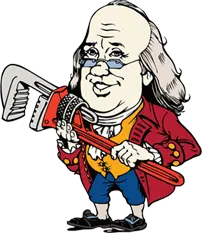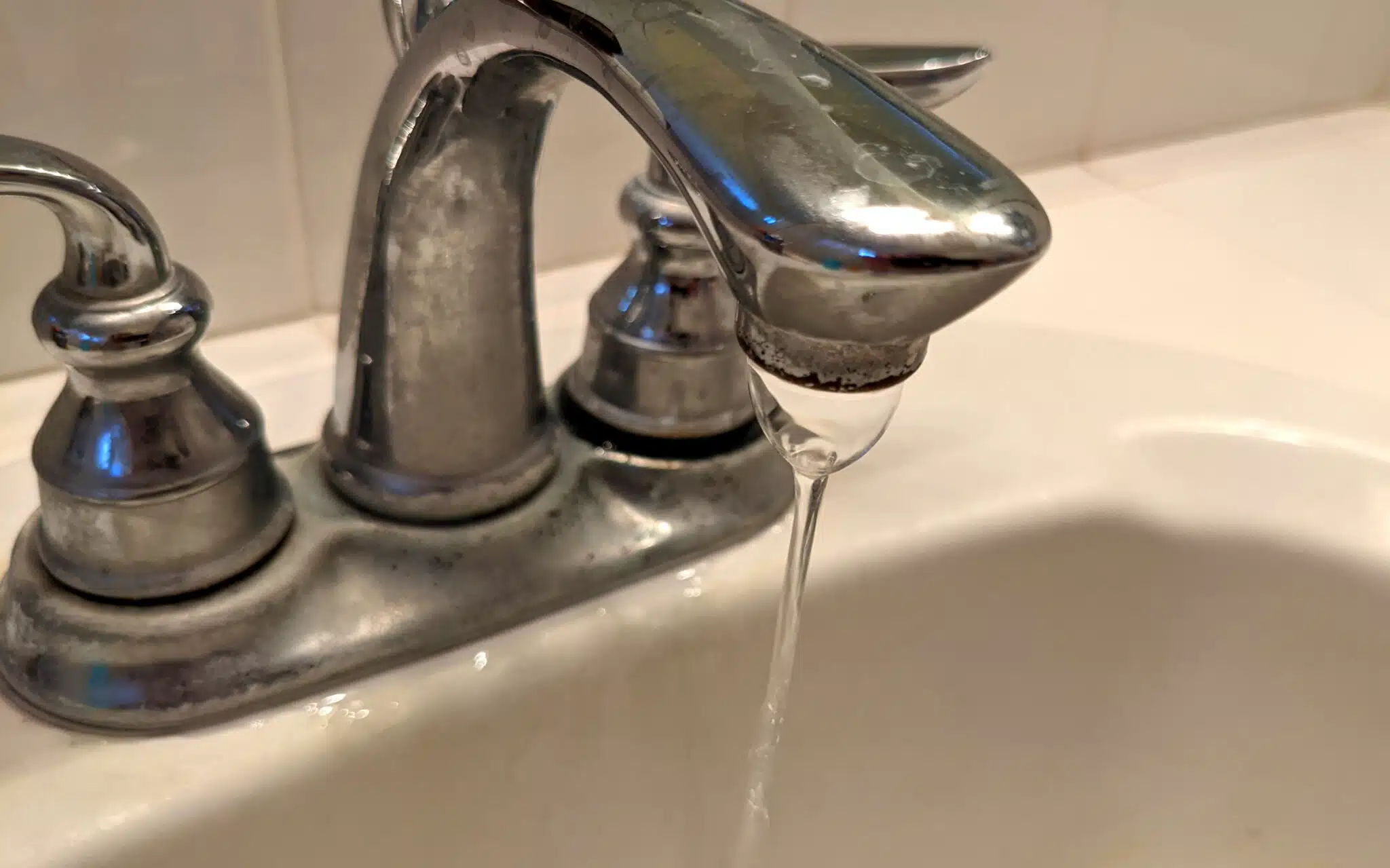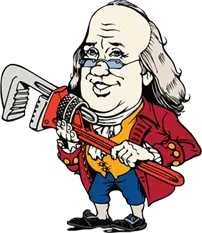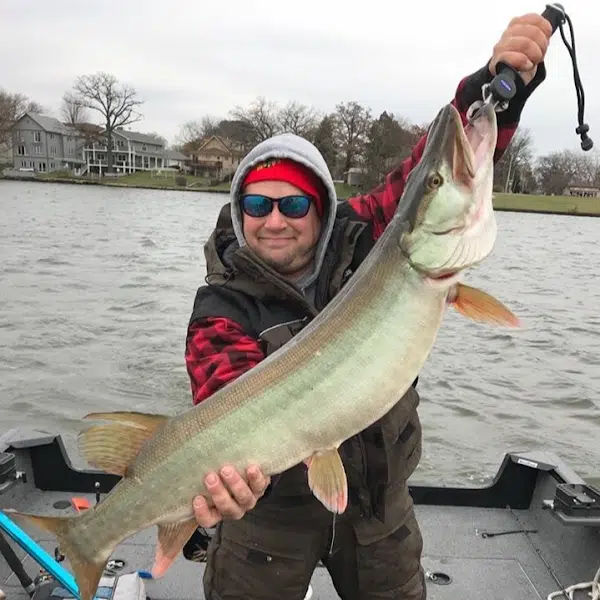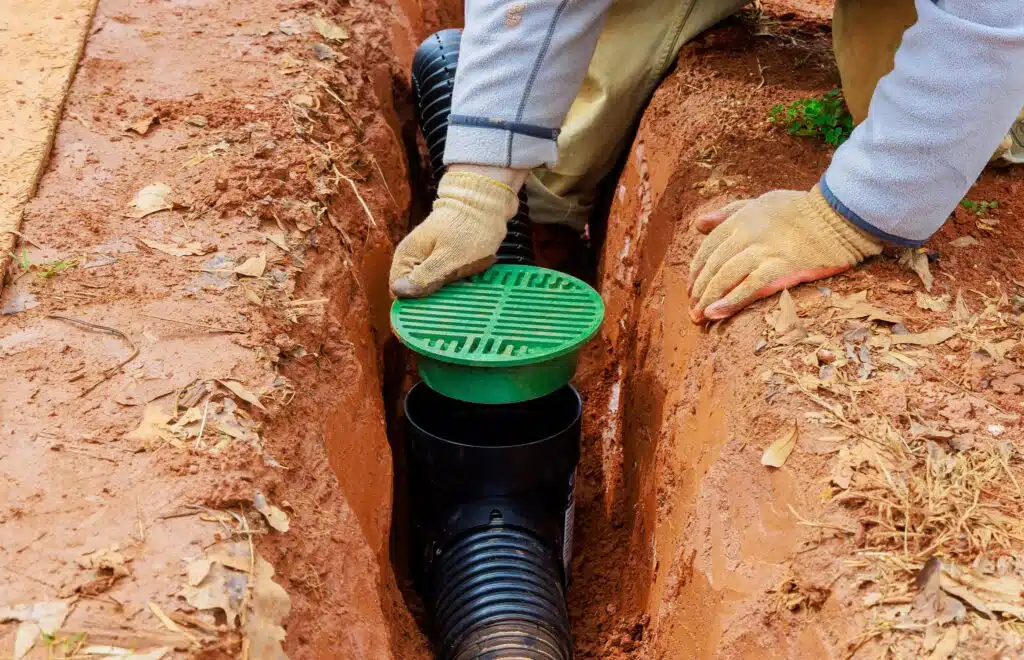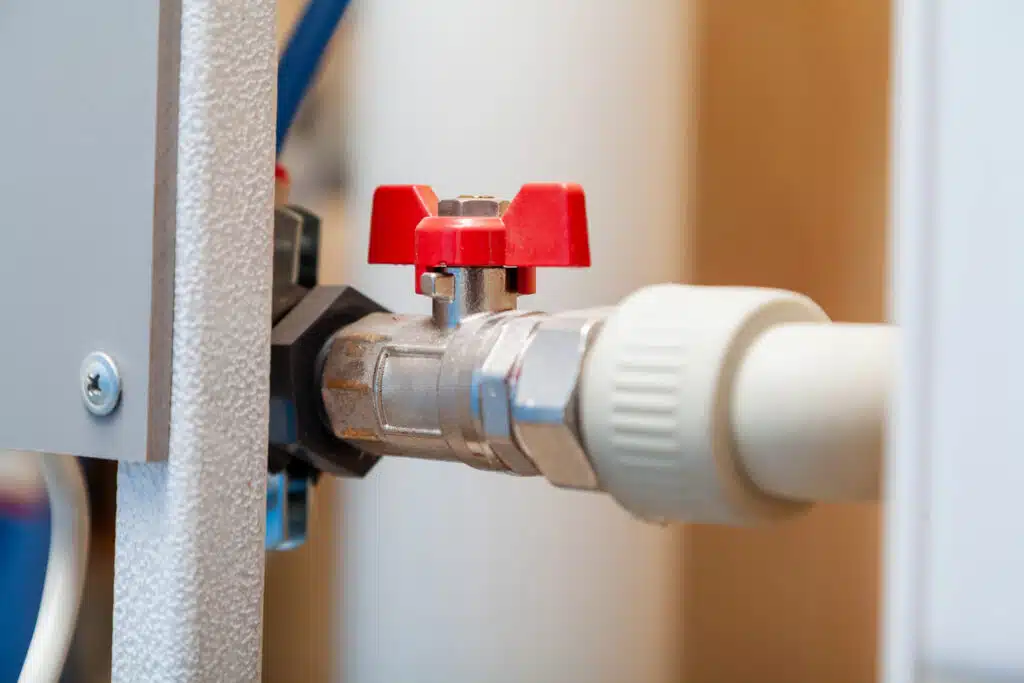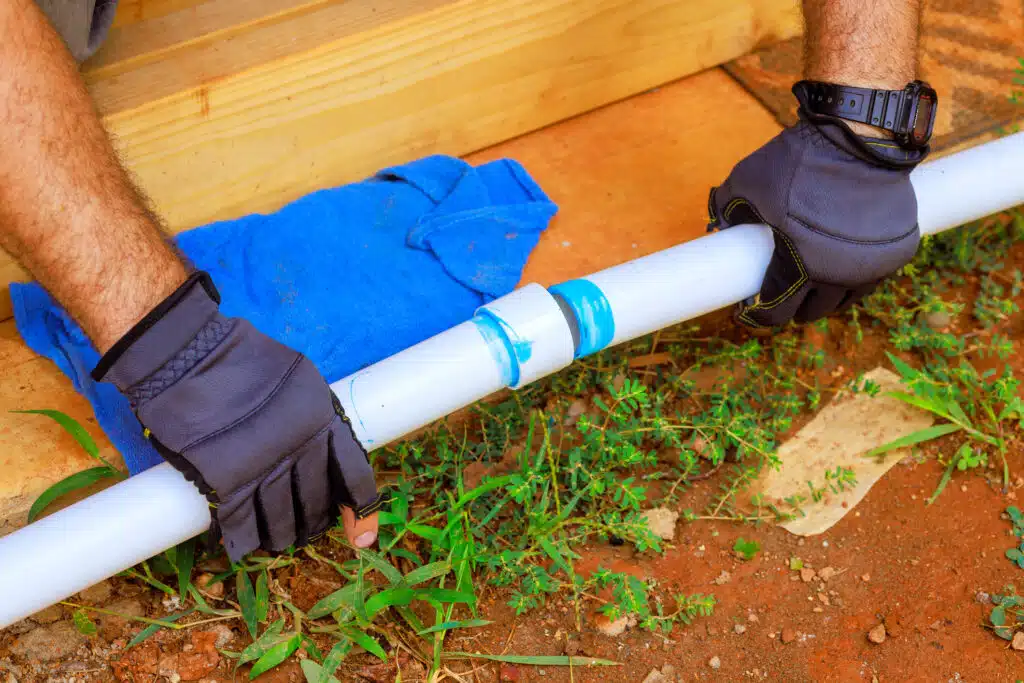When winter rolls into Lancaster, water pressure problems can turn everyday tasks into frustrating challenges. From frozen pipes to unexpected leaks, water pressure issues during the colder months can disrupt your routine.
Winter’s freezing temperatures, coupled with increased water demand and aging infrastructure, make Lancaster homes particularly susceptible to these issues.
Common Winter Water Pressure Problems in Lancaster
Frozen Pipes
Freezing temperatures often cause water within pipes to solidify into ice, significantly restricting the flow and leading to reduced or completely blocked water pressure. This issue is particularly common in unheated spaces such as basements, crawl spaces, and garages, where pipes are directly exposed to the cold.
Ice buildup can also create immense pressure within the pipes, increasing the risk of them bursting if not addressed promptly. The damage caused by burst pipes can lead to costly repairs and potential water damage to your home. Proper insulation and proactive measures are essential to prevent pipes from freezing during Lancaster’s harsh winters.
Increased Water Demand
Winter typically sees a surge in water usage as households take longer hot showers, run more frequent laundry cycles, and increase dishwashing due to holiday gatherings. This additional strain on plumbing systems can result in noticeable dips in water pressure, particularly in older homes with outdated infrastructure.
The increased demand can exacerbate existing weaknesses in plumbing, leading to further complications such as slow water flow or uneven pressure.
Maintaining a balance between usage and plumbing capacity is critical to avoiding these disruptions. Investing in modernized plumbing systems can help withstand the seasonal spike in water usage.
Clogged Pipes
Sediment and mineral deposits gradually accumulate in pipes over time, but cold weather often intensifies this issue. Freezing temperatures slow down water flow, making it easier for sediment to settle and block pipes.
This results in restricted water movement, reduced pressure, and sometimes complete blockages, especially in homes with hard water systems.
Unaddressed clogs can strain your plumbing and reduce its efficiency, leading to higher energy bills and long-term damage. Regular drain cleaning, pipe maintenance, and flushing can help prevent sediment buildup, ensuring smooth and consistent water flow during winter.
Faulty Pressure Regulators
Pressure regulators are critical components designed to maintain consistent water pressure in your plumbing system, but cold weather can affect their performance. Extreme temperatures may cause regulators to malfunction, leading to fluctuating water pressure levels that disrupt your daily routines.
A faulty regulator can either cause a dramatic drop in pressure or lead to excessive force in the system, putting additional strain on your pipes.
In older homes, regulators may already be weakened, making them more susceptible to cold-induced failures. Timely inspections and replacements are necessary to maintain stable pressure throughout the season.
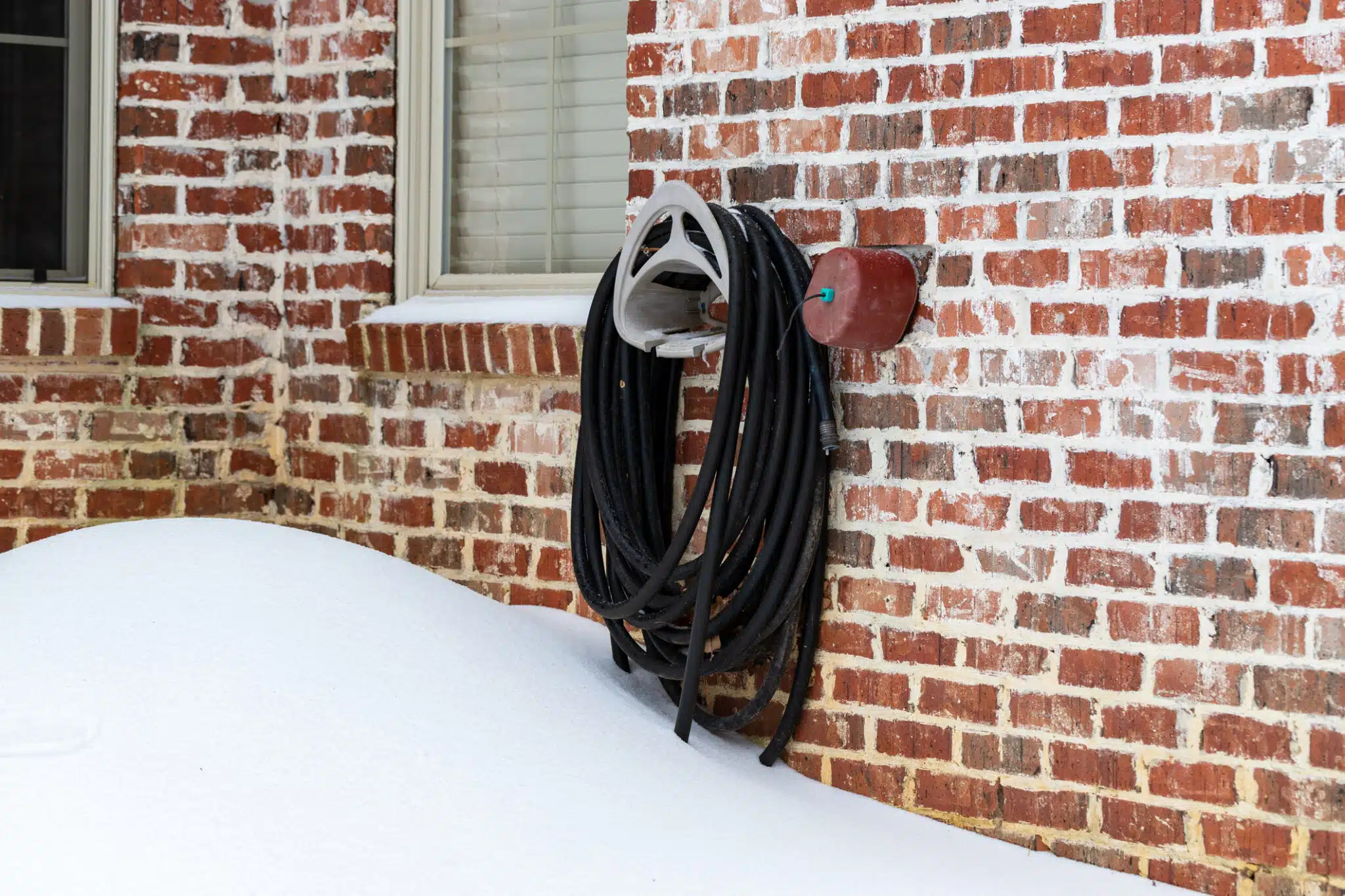
How Lancaster’s Winter Climate Contributes to Water Pressure Issues
Freezing Temperatures
Lancaster’s cold winters bring prolonged freezing spells that significantly increase the likelihood of frozen pipes. When temperatures remain below freezing for extended periods, water within pipes begins to solidify, restricting flow and causing pressure to drop.
Homes with older plumbing or insufficient insulation are particularly vulnerable to this issue. Prolonged freezing can lead to cracks or bursts in pipes, creating costly repair scenarios. Insulating pipes and maintaining a steady indoor temperature can help mitigate the impact of Lancaster’s harsh winters on plumbing systems.
Snow and Ice Build-Up
Heavy snow and ice accumulation pose additional risks to outdoor and underground plumbing systems. Snow can create excessive pressure on pipes buried shallowly, causing shifts or damage that disrupt water flow.
Ice forming around outdoor spigots or exposed pipes can result in cracks that lead to leaks and reduced pressure. Melting snow and ice can also seep into vulnerable areas of your plumbing, exacerbating existing issues.
Regularly clearing snow and ice from around plumbing fixtures and ensuring proper drainage can help protect your system during winter.
Older Infrastructure
Lancaster is home to many older residences, often equipped with aging plumbing systems that are less resilient to the challenges of winter weather. Older pipes, made from materials such as galvanized steel, are more susceptible to corrosion and freezing, which can lead to blockages and leaks.
The wear and tear on these systems often make them ill-equipped to handle the stress caused by freezing temperatures. Upgrading to modern, more durable materials like PEX or copper piping can provide better resistance to winter-related issues.
Routine inspections and proactive upgrades are vital for maintaining a reliable water supply during winter.
Signs of Winter Water Pressure Problems
Low Water Flow
A noticeable decrease in water flow from faucets or showerheads is a common indicator of winter water pressure problems. Frozen pipes often cause this issue by obstructing the normal water pathway, preventing adequate flow. Sediment buildup, exacerbated by freezing temperatures, can also contribute to sluggish water movement.
This reduced flow may start as a minor inconvenience but can quickly escalate into a significant disruption if left unaddressed. Timely identification and resolution of low water flow issues are essential to preventing more extensive plumbing damage.
Unusual Noises in Pipes
Winter conditions often lead to unusual sounds in plumbing systems, such as banging, whistling, or gurgling noises. These sounds may occur when air becomes trapped in pipes, often due to freezing or partial blockages. Sediment or debris caught in pipes can also create vibrations or loud noises as water struggles to pass through.
Left unchecked, these disturbances can indicate growing issues like pipe fractures or clogs. Professional inspection can help identify the source of the noise and prevent further complications in your plumbing system.
Water Discoloration
Rusty, cloudy, or discolored water emerging from your taps is another warning sign of winter-related plumbing issues. Freezing temperatures can disturb sediment settled in pipes, allowing it to mix with your water supply.
Discoloration may also result from leaks caused by expanding and contracting pipes, introducing rust or other contaminants into the system.
This issue not only reduces water quality but can also signal underlying problems that require immediate attention. Flushing your plumbing or consulting a professional can address discoloration effectively.
Tips to Prevent Winter Water Pressure Problems
Insulate Pipes
Proper insulation is one of the most effective ways to prevent winter water pressure problems. Pipes in unheated areas, such as basements, crawl spaces, and garages, are especially vulnerable to freezing.
Foam pipe insulation or heat tape can keep these pipes warm enough to prevent ice from forming and blocking water flow. By maintaining consistent water movement, insulation reduces the likelihood of low-pressure and burst pipes.
Investing in pipe insulation not only prevents immediate disruptions but also protects your plumbing system from long-term damage.
Seal Drafts
Drafty areas near plumbing lines can expose pipes to freezing temperatures, leading to water pressure problems. Sealing cracks, gaps, and other openings around doors, windows, and walls can prevent cold air from reaching pipes.
Weatherstripping and caulking are cost-effective solutions that offer long-term protection against drafts. This small adjustment can make a significant difference in preventing frozen pipes and preserving water pressure during the coldest months.
A well-sealed home also improves energy efficiency, making it a win-win solution for winter preparation.
Keep Faucets Dripping
Allowing faucets to drip slightly during freezing temperatures can prevent pressure buildup inside the pipes. This simple step ensures continuous water movement, making it harder for ice to form and cause water pressure problems.
While a dripping faucet may seem wasteful, it uses far less water than dealing with a burst pipe. This method is especially effective for pipes located in colder parts of your home, such as exterior walls or uninsulated spaces.
Combining this strategy with pipe insulation provides an extra layer of protection against winter plumbing issues.
Inspect Outdoor Fixtures
Outdoor fixtures like hoses and spigots are often the starting points for winter water pressure problems. Disconnect hoses and install insulated covers on outdoor faucets to reduce their exposure to freezing temperatures.
Ice forming in or around these fixtures can lead to blockages that affect the overall water pressure throughout your plumbing system.
Regularly checking for cracks or leaks in outdoor fixtures can prevent minor issues from escalating into significant problems. Taking proactive steps with outdoor plumbing is essential for ensuring consistent water flow during winter.
Solutions for Addressing Water Pressure Problems
Thaw Frozen Pipes Safely
Frozen pipes are a leading cause of water pressure problems during winter, but thawing them safely can prevent further damage. Gradually warming the pipes using a hair dryer, heat lamp, or portable heater is an effective approach.
Avoid using open flames or extreme heat, as these can cause pipes to crack or burst. Once the ice blockage is cleared, the water flow will gradually return to normal, restoring proper pressure. To prevent recurrence, insulating vulnerable pipes and keeping the area warm is essential.
Replace or Repair Damaged Pipes
Cracked or leaking pipes are common sources of winter water pressure problems, especially in homes with aging plumbing systems. Damaged pipes not only reduce pressure but can also lead to water waste and structural damage if left untreated.
Replacing old or worn pipes with modern, durable materials like PEX or copper ensures better resistance to winter conditions. Professional plumbers can assess the extent of the damage and provide targeted solutions to restore water flow. Timely repairs or replacements are critical to maintaining the integrity of your plumbing system.
Clear Clogs
Clogged pipes, often worsened by sediment and debris during winter, are a frequent contributor to water pressure problems. Using professional-grade tools like a plumber’s snake or hydro-jetting, blockages can be cleared effectively without harming the pipes.
These techniques remove accumulated debris, ensuring smooth water flow and restoring pressure. Addressing clogs promptly also prevents further complications, such as pipe bursts caused by pressure buildup. Regular pipe maintenance is a proactive way to avoid pressure issues throughout the colder months.
Adjust or Replace Pressure Regulators
Faulty pressure regulators can lead to erratic water flow and persistent water pressure problems, particularly in winter. A malfunctioning regulator may cause either excessively high or low pressure, disrupting your daily activities.
Professional plumbers can recalibrate the regulator to restore balanced pressure or replace it entirely if necessary.
Modern pressure regulators are designed to withstand temperature fluctuations better, offering more consistent performance during winter. Ensuring the proper functioning of your pressure regulator can significantly improve the reliability of your plumbing system.
When to Call a Professional Plumber
Persistent Low Pressure
Ongoing water pressure problems that persist despite DIY efforts are a strong indicator of underlying plumbing issues. Frozen pipes, hidden leaks, or malfunctioning pressure regulators may require specialized tools and expertise to diagnose and repair.
Attempting to address these problems without professional help can sometimes worsen the situation or lead to further damage.
A licensed plumber can thoroughly inspect your system and identify the root cause of the pressure drop. Seeking professional assistance early ensures the issue is resolved efficiently and prevents costly repairs.
Frequent Freezing
Pipes that freeze repeatedly during winter are a major cause of recurring water pressure problems. This issue often points to insufficient insulation or poor placement of pipes in unheated spaces.
Professional plumbers can evaluate your home’s plumbing design and recommend rerouting or insulating solutions to prevent future freezing.
They may also install advanced heating elements or insulation wraps for vulnerable areas. By addressing the problem comprehensively, a professional can provide long-term protection against freezing and pressure disruptions.
Visible Leaks
Leaks caused by winter temperature fluctuations are a common source of water pressure problems and visible signs like dripping or pooling water warrant immediate attention. Left unchecked, these leaks can escalate into major issues, damaging your home’s structure and increasing water bills.
A plumber can locate both visible and hidden leaks using specialized detection tools, ensuring thorough repairs. Fixing leaks promptly restores water pressure and helps maintain the efficiency of your plumbing system. Professional intervention is essential for preventing long-term damage.

Benefits of Professional Plumbing Services
Accurate Diagnosis
Professional plumbers bring expertise and advanced tools to accurately identify the root cause of water pressure problems, saving homeowners from guesswork. Winter issues such as frozen pipes, hidden leaks, or faulty regulators can be challenging to pinpoint without specialized equipment.
Plumbers can detect problems that may not be immediately visible, like underground leaks or sediment blockages deep within the system.
A precise diagnosis ensures that the correct repairs are made, preventing unnecessary disruptions or costly mistakes. By relying on a professional, homeowners gain confidence that their plumbing system is in expert hands.
Long-Term Solutions
DIY fixes for water pressure problems often provide temporary relief but fail to address the underlying issues. Professional plumbers implement durable solutions that eliminate the problem at its source, reducing the likelihood of recurrence.
For instance, they may replace aging pipes, install high-quality pressure regulators, or apply advanced insulation techniques to protect pipes from freezing.
These long-term solutions not only restore proper water flow but also enhance the resilience of your plumbing system. Investing in professional services saves time and money in the long run by preventing repeat issues.
Emergency Support
Winter water pressure problems can escalate quickly, leading to situations like burst pipes or severe leaks that require immediate attention. Professional plumbing services offer rapid response during emergencies, minimizing damage and restoring functionality to your system.
With their expertise, they can quickly assess the situation, implement effective repairs, and prevent further complications. Having access to emergency plumbing support is invaluable for homeowners dealing with unexpected winter plumbing challenges. Quick intervention can make the difference between a minor inconvenience and a major repair project.
Winter Plumbing Giving You Trouble? Let Us Help!
Struggling with weak water flow or frozen pipes in Lancaster, PA, and nearby areas like Lebanon and Reading? Benjamin Franklin Plumbing of Lancaster has the expertise to resolve your plumbing issues and keep your home running smoothly this winter.
Don’t let cold weather wreak havoc on your system—reach out today to schedule your service and ensure your plumbing is ready for the season!
Frequently Asked Questions (FAQ)
1. What causes water pressure problems in winter?
Water pressure problems in winter are commonly caused by frozen pipes, increased water demand, sediment buildup, leaks due to temperature fluctuations, and faulty pressure regulators. Cold weather exacerbates these issues, particularly in older or uninsulated plumbing systems.
2. How can I prevent frozen pipes in my home?
To prevent frozen pipes, insulate exposed pipes with foam or heat tape, seal drafts near plumbing lines, and keep faucets dripping during extremely cold temperatures. Additionally, maintaining a consistent indoor temperature can help protect pipes from freezing.
3. Why does my water pressure remain low even after thawing frozen pipes?
Low water pressure after thawing frozen pipes may indicate damage such as cracks or leaks that occurred during freezing. Sediment or debris dislodged by the freeze can also clog pipes. A professional inspection is often necessary to identify and address the problem.
4. When should I call a plumber for water pressure problems?
You should call a plumber if water pressure problems persist despite basic fixes, if pipes freeze frequently, if there are visible leaks, or if you suspect damage in an older plumbing system. Professionals can diagnose and resolve these issues effectively.
5. Can professional plumbing services address recurring water pressure problems?
Yes, professional plumbers provide long-term solutions for recurring water pressure problems. They can replace aging infrastructure, repair leaks, adjust pressure regulators, and insulate pipes to prevent seasonal disruptions and enhance system performance.




